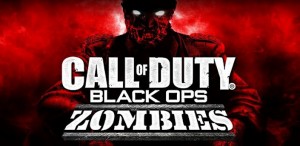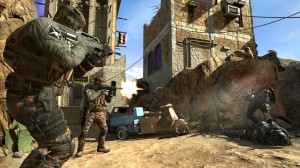Earlier this week, independent video game developer Robotoki became the first studio to commit to creating a title exclusively for Ouya, the $99 Android-based console that is breaking records on crowd-funding website Kickstarter.
The Human Element episodic prequel will introduce players to a zombie apocalypse and prepare them for the full version of the game launching sometime in 2015.
Robotoki president and former Call of Duty creative strategist Robert Bowling is excited about bringing Human Element to Ouya. So excited, in fact, that he’s pledged $10,000 of his own money on Kickstarter to the company building the console. GamesBeat recently chatted with Bowling about his company’s announcement and new game, and about his departure from triple-A game development.
GamesBeat: Are you at all worried about investing so much money in Ouya?
Robert Bowling: I’m not because this is exactly what I’m excited about. This is the type of stuff that I want to invest in. The stuff that is trying to do something new and innovative. Something that’s going to encourage us as designers to get outside our comfort zone. Because I believe that as much as this is about business — our industry as a business — first and foremost, it’s a creative field. And if we’re not taking these risks, and we’re not taking these leaps, then we’re going to become stagnant. We’re going to become unemotionally invested in what we’re doing, and our products won’t be good.
Could I have made this decision a year ago working on Call of Duty? Possibly not. But this is what being independent, being small, and being nimble is all about. We’re able to make commitments like these and take bigger risks. And what I like about Ouya and what encouraged me to commit to it was the fact that Ouya is different. We’re able to rapidly prototype stuff that’s much more cost-effective and much less risk averse than what we could have ever done committing to some other platform.
GamesBeat: You were formerly creative strategist for Call of Duty at Infinity Ward. Now you’re president of your own studio, Robotoki. Why did you decide to leave and go indie?
Bowling: I worked on Call of Duty for seven years. So it’s a project that I’ve been on since the very early days, and I loved doing it. But the thing is when you’re working on one creative project for that amount of time, and no matter what it is, you’re really creating lists in your head of experiences and characters and moments that you want to deliver and that fit within that universe that you’re creating. But then you’re also creating another list of experiences, moments, characters, and stories that you want to tell that don’t fit that universe for one reason or another. And over time, one of those lists is getting smaller because you’re checking stuff off as you complete them, and one of those lists is getting bigger. And at some point — and that point happened to be earlier this year — that list gets completed. And when that happens, you have to move on. You have to move on and start exploring that other list. The only way to do that for me was to move out on my own and create Robotoki because I needed that extra benefit of being small and nimble. Because what we want to accomplish is riskier.
GamesBeat: Big name publishers are notorious for not taking those kinds of risks.
Bowling: Exactly. And that’s not their job, per se. Their job is to — because they’re public companies that have shareholders — their job is to turn a profit, and they’re legally obligated to do that. That’s why when I formed Robotoki, it was very important to me that, at the beginning, I was self-funding everything. That I was setting up our foundation with my own money and taking that risk off the table for anybody else. That allowed us to really set our foundation on creative principles that were not influenced by the need for outside funding. We don’t plan to do that forever. Obviously, we plan to bring products to market with the help of other partners, but setting that foundation was most important. You don’t have that luxury as a big, public company.
GamesBeat: Tell me a little about Human Element.
Bowling: There are multiple areas that you really have to cover to fully understand Human Element. When we announced it at [the Electronic Entertainment Expo], I was very adamant about saying that we’re not announcing a game. We’re announcing a universe. This is a new intellectual property, and we really want to introduce you to this world that we’re creating. What’s important, what we’re showing with Ouya, what we’re doing on mobile, and what we’re planning for 2015 is an experience that will adapt and change based on the device you’re engaging with. So what we’re doing on mobile is very different from what we’re planning on doing with the at-home experience in 2015, and it will be very different from the episodic content that we’re bringing exclusively to Ouya.
Human Element is a world that takes place 35 years after an event has occurred, and that event is a zombie apocalypse. But this is not a game about zombies. They’re really just a catalyst to kick off these stories of human survival scenarios. What we’re really concerned about is the true threat in this apocalypse, which is that human element. The other survivors are smart and strong enough to compete for what we have, and they have conflicting mentalities and ideals of what the future should be. So that’s what we’re looking at: the physical, but most importantly, the emotional and mental survival of these humans after the fall of society.
Read more…
 Black Ops Zombies was released on Sony Xperia devices! You will be able to fight the horde with your friends: You can download it here or from your Android Market “Play” App.
Black Ops Zombies was released on Sony Xperia devices! You will be able to fight the horde with your friends: You can download it here or from your Android Market “Play” App.















